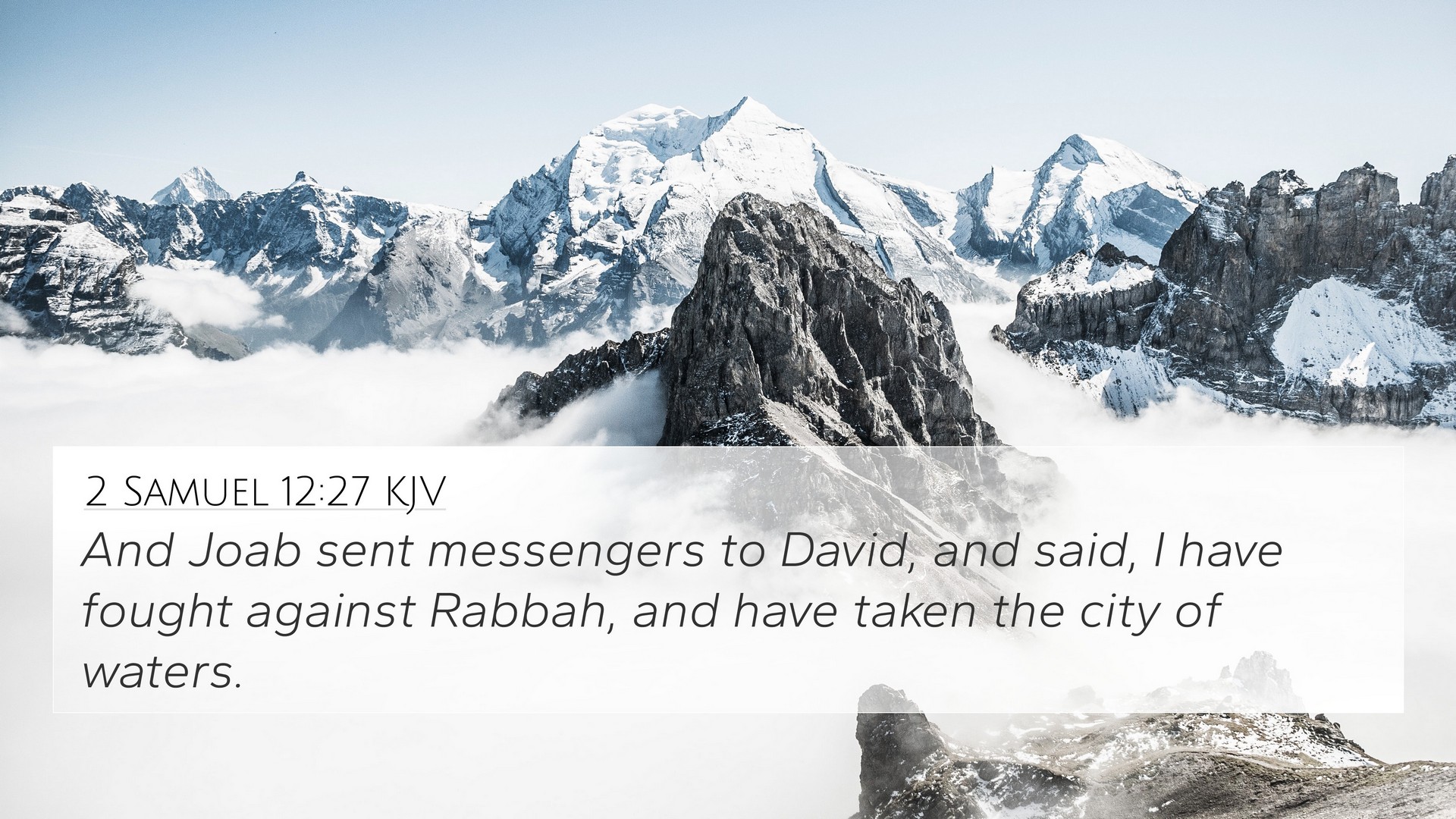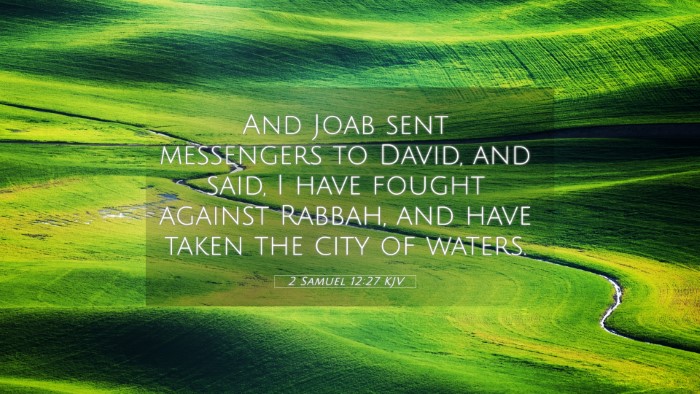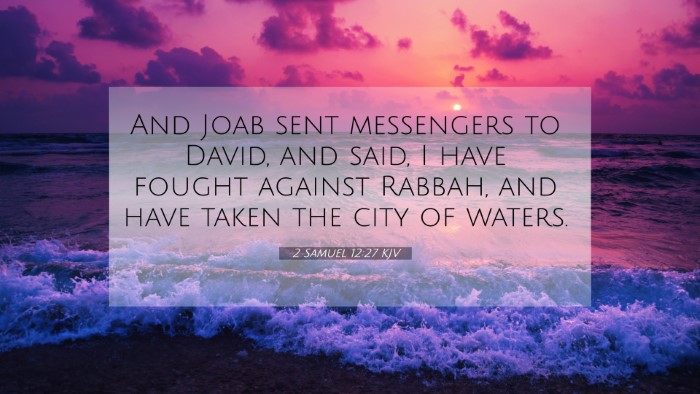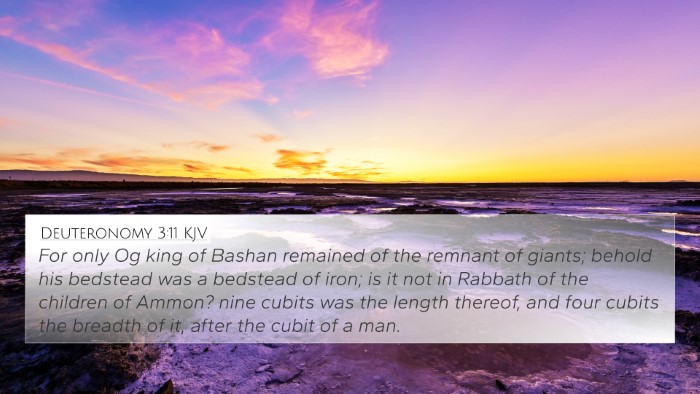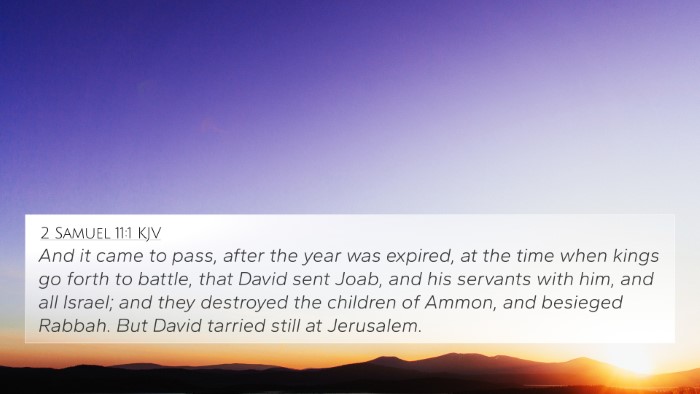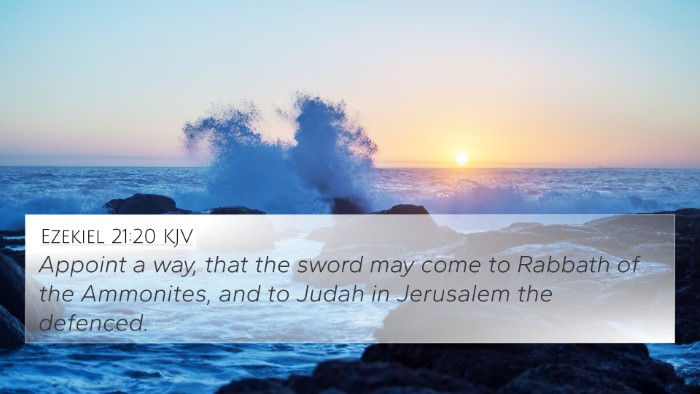Understanding 2 Samuel 12:27
2 Samuel 12:27 states: "And he sent messengers to David, and said, 'I have fought against Rabbah, and have taken the city of waters.'"
This verse is significant as it marks a moment of military success for David and emphasizes God's presence in his victories. Commentaries from Matthew Henry, Albert Barnes, and Adam Clarke provide a deeper understanding of its implications.
Commentary Insights
-
Matthew Henry:
Henry observes that the victory over Rabbah was not just a military achievement but also a spiritual reminder. His comment focuses on the fact that God's anointing of David guarantees success in his endeavors, which is indicative of the larger divine plan for Israel. This victory reiterates God's support for David, despite past sins.
-
Albert Barnes:
Barnes emphasizes the strategic significance of Rabbah, noting that the city was a stronghold of the Ammonites. His insight reveals that by taking this city, David solidified his power and authority in the region. Barnes also connects this to the effectiveness of David's leadership and God's providential hand over his actions.
-
Adam Clarke:
Clarke’s commentary provides a historical context, detailing how the city of Rabbah was a center of water resources, which were crucial for sustaining the army and the inhabitants. He argues that the victory here indicates not only military prowess but also highlights the importance of reliable supplies in warfare and strategy.
Bible Cross-References
To deepen the understanding of 2 Samuel 12:27, the following cross-references are pertinent:
- 1 Chronicles 20:1: Discusses the siege of Rabbah and its significance in David's reign.
- 2 Samuel 11:1: Gives context on David's earlier actions leading to this moment.
- 1 Samuel 17:47: Reflects David's reliance on God for victory, similar to his conquests.
- Psalm 20:7-8: Expresses trust in God for triumphs in battle.
- Deuteronomy 20:4: Encouragement of Israel’s military endeavors under divine guidance.
- Joshua 10:8: God assuring Joshua of victory, paralleling the support David receives.
- Romans 8:31: The assurance that if God is for us, no one can stand against us, echoing David's victories.
- 2 Samuel 7:9: God's promise of security for David’s rule, which provides a backdrop for these victories.
Connections Between Bible Verses
The verse can be linked thematically to other scriptures, showcasing the overarching narrative of God's involvement in human affairs. The links can be traced through similar themes of divine support during warfare and leadership.
Thematic Bible Verse Connections
The theme of God's providence in times of conflict recurs throughout the scriptures, highlighted in the following contexts:
- Divine guidance as seen in Psalm 32:8
- God's promise of victory in Isaiah 54:17
- The role of faithful leadership in Proverbs 21:31
Comparative Bible Verse Analysis
A comparative analysis of Old Testament and New Testament scriptures can shed light on the continuity of God's promises. For example, Jesus emphasizes the importance of faith in achieving victory in Mark 10:27, reflecting a spiritual parallel to David's reliance on God.
Practical Tools for Bible Cross-Referencing
Utilizing tools such as a Bible concordance or specific Bible cross-reference guides can aid in identifying such connections. Tools for cross-referencing scriptures enhance understanding and provide a more robust study method when examining passages like 2 Samuel 12:27.
Conclusion
In summary, 2 Samuel 12:27 serves as a pivotal verse illustrating God's active role in the leadership of David. The commentaries enrich our understanding while cross-references offer broader biblical insights into the themes of divine support and military victory. By exploring the connections presented, the verse not only stands alone but also resonates deeply within the larger biblical narrative.
